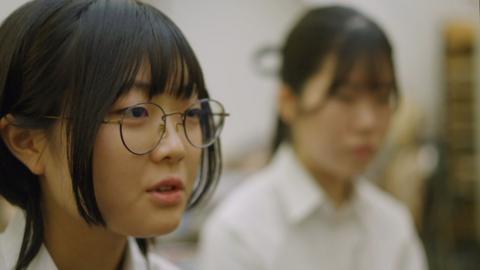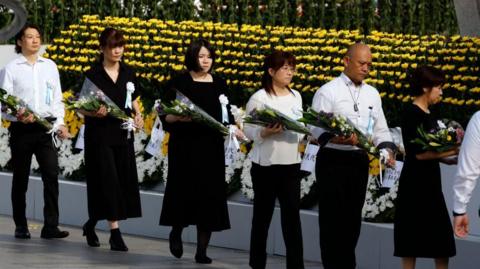Hiroshima 80 Years On: A Sobering Reminder of Nuclear Folly
Hello everyone. Today, we’re diving headfirst into the radioactive pool of history, politics, and human folly as we mark the 80th anniversary of the atomic bombing of Hiroshima. If you thought the world had learned its lesson after vaporizing two cities and killing over 200,000 people, well, buckle up, because apparently, we’re still playing with matches in a fireworks factory.
A Ceremony of Contradictions
Let’s start with the ceremony itself. Japanese Prime Minister Shigeru Ishiba showed up in his best black suit, flanked by a cadre of equally somber men in black. It’s almost as if they were attending a funeral for common sense. Alongside them was Hiroshima’s mayor, Kazumi Matsui, who delivered a speech dripping with warnings about the “accelerating trend toward military build-up” and the “flagrant disregard” for the lessons of history. You know, the kind of speech that makes you nod sagely while secretly wondering if anyone in power is actually listening.
Matsui’s words were a masterclass in stating the obvious: nuclear weapons are bad, m’kay? He lamented the dysfunctionality of the nuclear Non-Proliferation Treaty and called on Japan to ratify the Treaty on the Prohibition of Nuclear Weapons. Spoiler alert: Japan hasn’t, because apparently, having the US’s nuclear umbrella is just too cozy to give up. It’s like refusing to quit smoking because you enjoy the warmth of the cigarette, even as your lungs turn to ash.
Survivors: Living Testaments to Horror
Now, let’s talk about the real stars of this grim show: the survivors. Shingo Naito, who was six when the bomb dropped, recalls his father’s skin hanging from his body, unable to even hold his hand. If that doesn’t make you want to throw every nuke into the sun, I don’t know what will. Naito’s memories are being turned into art by students, because apparently, the only way to get people to pay attention these days is to make it Instagrammable.

Then there’s Satoshi Tanaka, a man who’s had more cancers than most people have had hot dinners, thanks to radiation exposure. Watching the carnage in Gaza and Ukraine, he’s reminded of his own suffering. “We are living alongside nuclear weapons that could wipe out humanity multiple times over,” he says. But hey, at least we’ve got mutually assured destruction to keep us warm at night, right?
The Nobel Peace Prize: A Participation Trophy?
In 2024, Nihon Hidankyo, a group of atomic bomb survivors, won the Nobel Peace Prize for their efforts to rid the world of nuclear weapons. That’s right, folks—survivors of one of humanity’s greatest atrocities are still having to beg world leaders to stop stockpiling doomsday devices. It’s like giving a participation trophy to someone who’s been running a marathon for 80 years and telling them, “Good job, but keep going.”
Japan’s Nuclear Dilemma: Security Blanket or Death Wish?
Japan’s stance on nuclear weapons is a masterclass in cognitive dissonance. On one hand, they’re the only country to have suffered a nuclear attack. On the other, they refuse to ban nuclear weapons, arguing that US nukes make them safer. It’s like a burn victim insisting on keeping a flamethrower in the house for protection. The logic is as twisted as a pretzel in a tornado.
Meanwhile, the US and Russia, those paragons of restraint, oppose the nuclear ban treaty, citing the “deterrence function” of their arsenals. Because nothing says peace like the ability to annihilate the planet several times over. It’s the diplomatic equivalent of two toddlers holding loaded guns and daring each other to blink first.
Public Outcry: A Whisper in the Wind
On the streets of Hiroshima, small protests called for the abolition of nuclear weapons. Small protests. After 80 years, the best we can muster is a handful of people with signs. It’s almost as if the world has collective amnesia, or maybe we’re just too busy binge-watching the latest Netflix series to care about the looming threat of nuclear annihilation.
The Medical Perspective: A Doctor’s Diagnosis
As a doctor, I can tell you that the world’s obsession with nuclear weapons is a textbook case of self-destructive behavior. It’s like a patient who knows smoking will kill them but lights up anyway, convinced they’re the exception to the rule. The symptoms are clear: paranoia, denial, and a chronic inability to learn from past trauma. The prognosis? Grim, unless we get our act together.
Gaming the System: Nuclear Edition
From a gamer’s perspective, the current global situation is like a high-stakes round of Russian Roulette, except everyone’s using rocket launchers instead of revolvers. The “deterrence” strategy is the ultimate camping tactic—everyone’s holed up in their bunkers, waiting for someone else to make the first move. It’s less Call of Duty and more Fallout, with the potential for a real-life game over.
Conclusion: Lessons Unlearned
So, what have we learned after 80 years? Apparently, not much. We still cling to the illusion that nuclear weapons keep us safe, even as survivors like Naito and Tanaka bear witness to the horrors they unleash. World leaders pay lip service to peace while stockpiling enough firepower to turn the planet into a cinder. And the rest of us? We watch, we remember, and then we forget—until the next anniversary rolls around.
In the end, the Hiroshima ceremony is less a commemoration and more a cautionary tale—a reminder that humanity’s capacity for self-destruction is matched only by its ability to ignore the bleeding obvious. If we don’t start listening to the survivors, the next anniversary might be one we don’t live to see.
And that, ladies and gentlemen, is entirely my opinion.
Source: Hiroshima marks 80 years since atomic bombing, https://www.bbc.com/news/articles/cm2v58qrjq0o

